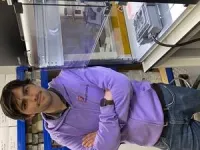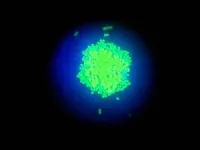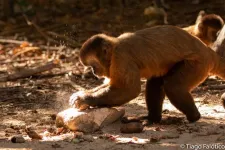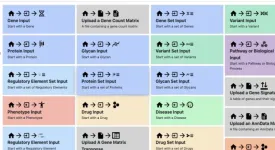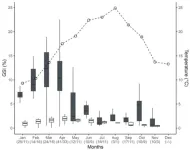(Press-News.org) Engineers at a University of Bristol spin-out company have created a new technology that can move cells without touching them, enabling critical tasks that currently require large pieces of lab equipment to be carried out on a benchtop device.
The invention could accelerate the discovery of new medicines and unlock personalised medicine screening in clinics.
The groundbreaking concept was unveiled for the first time today in an article in Science published by Dr Luke Cox, where he describes his journey from University of Bristol student to CEO of start-up company Impulsonics. The article is a prize essay in the Bioinnovation Institute and Science Prize for Innovation.
Behind every new drug lies thousands of hours spent by scientists growing cells in a petri dish to test it before it is tried on patients. Even in 2025 this remains a highly manual and difficult to automate process, leading to expensive and sometimes unreliable processes that make it harder to develop novel lifesaving drugs to the point when they can be used in the clinic.
The new technology uses acoustic waves to move cells, which appear to “dance.” This capability replaces the need for many large pieces of equipment in a lab and could make it significantly easier to automate cell growth and help scientists discover new drugs faster. It also opens up new possibilities in the clinic, such as personalised medicine screening, where many different drugs can be tested to find the most effective before being given to a patient.
Luke initially worked on the physics of acoustic levitation of a diamond, creating an experiment to hold objects in mid-air against gravity. Observing this seemingly magical experiment, he realised that the technology had the potential to transform our ability to handle small-delicate objects. This led him to next work on moving cells. The final step was realising that this technology could replace many of the common processes performed in biomedical labs. From this realisation, the company Impulsonics emerged.
Luke and his team have now developed this idea to the point where complex biomedical tasks, such as expanding a cell population, can be performed with this technology. Dr Luke Cox said: “A huge benefit of this technology is that it allows the process of screening new drugs to be accelerated. This means it can help discover new drugs for all kinds of diseases ranging from cancer to Alzheimer’s.”
Professor Bruce Drinkwater, an academic at the University of Bristol and a co-founder of Impulsonics, said “The device is small, with a footprint half the size of a standard lab bench where previous technologies took up whole rooms. Critically it also helps produce very high-quality data quickly, which is exactly what is needed in biomedical research.”
In the future this invention has many potential applications across biotechnology. Luke Cox concluded: “I look forward to expanding this unique technology platform to accelerate development across the pharmaceutical and healthcare industries wherever cells are grown.”
END
Dancing with the cells – how acoustically levitating a diamond led to a breakthrough in biotech automation
2025-04-03
ELSE PRESS RELEASES FROM THIS DATE:
Machine learning helps construct an evolutionary timeline of bacteria
2025-04-03
University of Queensland scientists have helped to construct a detailed timeline for bacterial evolution, suggesting some bacteria used oxygen long before evolving the ability to produce it through photosynthesis.
The multinational collaboration – led by researchers from the Okinawa Institute of Science and Technology, the University of Bristol, Queensland University of Technology and UQ – focused on how microorganisms responded to the Great Oxygenation Event (GOE) about 2.33 billion years ago, which changed ...
Cellular regulator of mRNA vaccine revealed... offering new therapeutic options
2025-04-03
A team of researchers led by Dr. KIM V. Narry, director of the Center for RNA Research at the Institute for Basic Science (IBS), has uncovered a key cellular mechanism that affects the function of mRNA vaccines and therapeutics. Their study, recently published in Science, provides the first comprehensive understanding of how mRNA vaccines are delivered, processed, and degraded within cells—a breakthrough that could pave the way for more effective vaccines and RNA-based treatments.
Messenger RNA (mRNA) is the genetic blueprint that tells cells how to produce proteins. It plays a vital role in mRNA vaccines, such as those used for COVID-19, and is also a promising ...
Animal behavioral diversity at risk in the face of declining biodiversity
2025-04-03
Our environment is changing rapidly, largely as a result of human activities, leading to a significant decline in biodiversity. According to researchers from the University of Victoria and the Max Planck Institute for Evolutionary Anthropology, this decline does not only affect animal life, but also our understanding of their behavior, including tool use.
"Cultural behaviors range from the songs of whales to the tool use of primates," says Ammie Kalan of the University of Victoria. "These adaptations to environmental change not only benefit the animals, but also provide important insights into the origins of behavior and learning across species. However, shrinking ...
Finding their way: GPS ignites independence in older adult drivers
2025-04-03
GPS tech may empower older adults to be more adventurous on the road, according to a study published April 3, 2025 in the open-access journal PLOS Digital Health by Sol Morrissey from the University of East Anglia and colleagues.
Driving is older adults’ preferred transportation method, but age-related cognitive decline can limit time spent behind the wheel. Empowering older adults to be more mobile drivers (that is, driving more frequently and for longer distances) is critical to boosting physical, social and cognitive wellness. Electronic navigation systems ...
Antibiotic resistance among key bacterial species plateaus over time
2025-04-03
Antibiotic resistance tends to stabilize over time, according to a study published April 3, 2025 in the open-access journal PLOS Pathogens by Sonja Lehtinen from the University of Lausanne, Switzerland, and colleagues.
Antibiotic resistance is a major public health concern, contributing to an estimated 5 million deaths per year. Understanding long-term resistance patterns could help public health researchers to monitor and characterize drug resistance as well as inform the impact of interventions on resistance.
In this study, researchers analyzed drug resistance in more than 3 million bacterial samples collected across ...
‘Some insects are declining but what’s happening to the other 99%?’
2025-04-03
Insects are the dominant form of animal life on our planet, providing humans and wildlife with pollination, food, and recycling services but, despite concerns about population declines, little is known about how 99% of species globally are faring.
A new approach is needed to better monitor species and protect them from the impacts of climate and land use change, pollution and invasive non-native species as soon as possible, according to a study led by the UK Centre for Ecology & Hydrology (UKCEH) and ZSL (Zoological Society of London).
The researchers, whose work has been ...
Powerful new software platform could reshape biomedical research by making data analysis more accessible
2025-04-03
New York, NY [April 3, 2025]— A powerful new software platform called the Playbook Workflow Builder is set to transform biomedical research by allowing scientists to conduct complex and customized data analyses without advanced programming skills. An article that describes the new platform was published in the April 3 online issue of the journal PLOS Computational Biology.
Developed by a multi-institutional team that was led by Icahn School of Medicine at Mount Sinai investigators as part of the National Institutes of Health Common Fund Data ...
Revealing capillaries and cells in living organs with ultrasound
2025-04-03
Ultrasound is one of the most widely used imaging techniques in medicine, but up until recently it hardly played a role in imaging the tiniest structures of our bodies such as cells. “Clinical ultrasound, like the kind used for pregnancy scans, creates real-time images of body parts”, first author Baptiste Heiles explains. “It allows diagnosis of various diseases, or to monitor a developing baby. However, what is going on at a microscopic level remains hidden.”
Imaging living cells in 3D
Now, a team of scientists from TU Delft, the Netherlands Institute for Neuroscience and Caltech managed to image specifically ...
American College of Physicians awards $260,000 in grants to address equity challenges in obesity care
2025-04-03
PHILADELPHIA, April 3, 2025 – Today, the American College of Physicians (ACP) announced that it has awarded a total of $260,000 in grants to support regional programs that address equity challenges in obesity care. Thirteen grantees were each awarded $20,000 to implement collaborative regional outreach projects.
Through “Advancing Equitable Obesity Care through Regional Action Grants,” ACP aims to inspire local collaboration models across the country to train and empower medical professionals to partner with patients to combat misinformation and heighten clinical capacity to manage care for people with obesity. The program capitalizes ...
Researchers from MARE ULisboa discover that the European catfish, an invasive species in Portugal, has a prolonged breeding season, enhancing its invasive potential
2025-04-03
The European Catfish is the largest freshwater fish in Europe, reaching up to 2.8 meters in length and 130 kg in weight. It was first detected in Portugal in 2014. As a top predator, it has no natural enemies and exhibits high fecundity, with females capable of producing up to half a million oocytes (unfertilized eggs). “This is not new information, as this invasive species reaches large sizes, and there is a direct relationship between abdominal cavity volume and the total number of oocytes produced,” said Christos Gkenas, a researcher at MARE-ULisboa and the study’s lead author. ...

